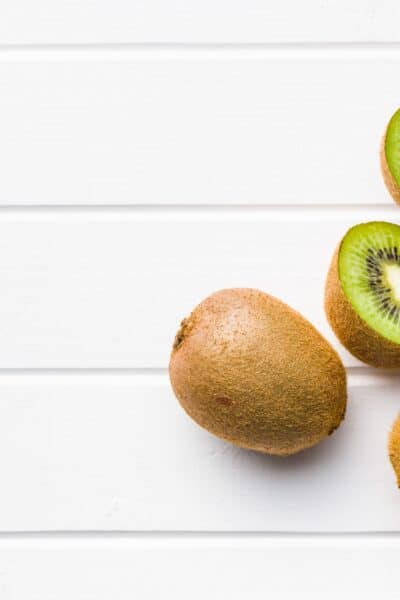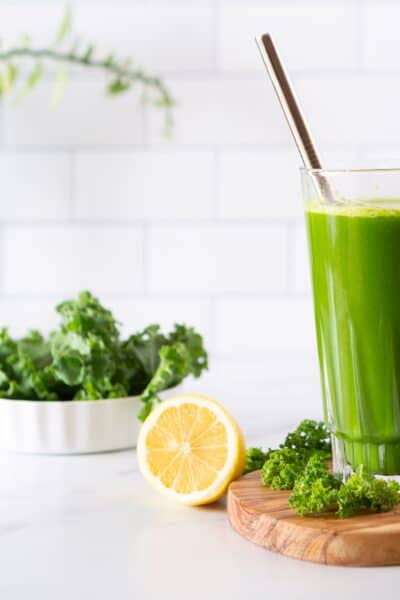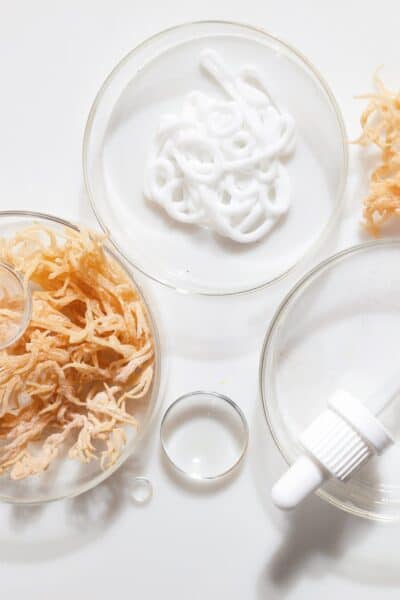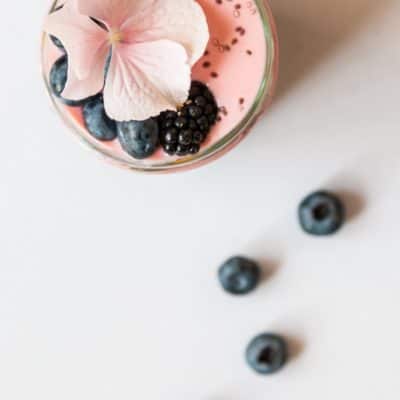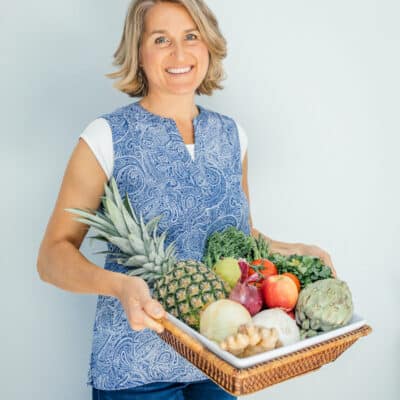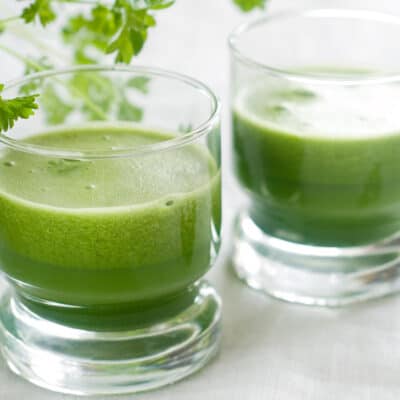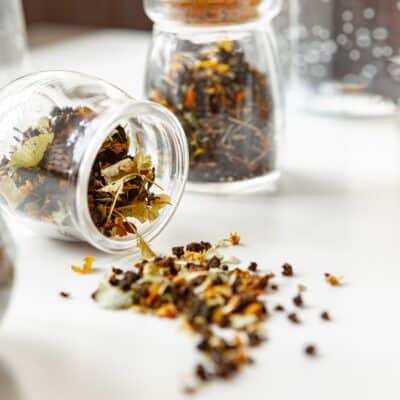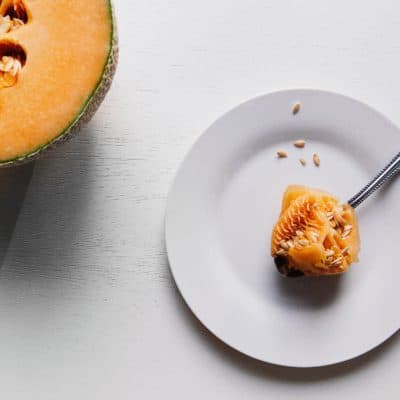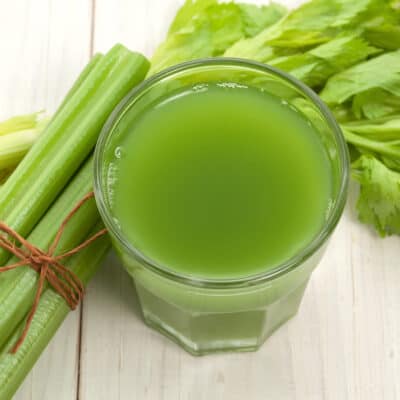To sign up for my Go Vegan For 30 Days program for just $1/day, click here.
If it has “nutrition” in its name, nutritional yeast has to be healthy, right?
Nutritional yeast, also called “nooch,” is a flavor enhancer that has a nutty, cheesy taste and is popular among vegans in place of cheese. While nutritional yeast is free of animal products and thus technically vegan, is it healthy for you? Here’s some details to help you decide whether or not to include it in your diet.
Note: While veganism is an ethical movement focused on compassionate practices for animals and sustainable practices for the environment, it has gained popularity for having many health benefits due to removing meat, dairy, and animal products and having a stereotype of eating more plants. Some people are drawn toward veganism for the health benefits and go towards a plant-based diet. The purpose of this article is to give tools for vegans, non-vegans, and those transitioning or contemplating transitioning to a plant-based or vegan diet – so that you can make the most informed decisions about your diet.
How Nutritional Yeast Is Made
This vegan condiment is made by culturing a yeast in a growing medium for several days. The growth medium requires a high amount of glucose and can vary from corn, sugarcane, beet molasses, etc (often genetically modified). When the yeast is ready, it is killed off with heat, removed, and dried.
If an ethical vegan is concerned about environmental effects, nutritional yeast proves to have some concern. The highest amounts of acetaldehyde, a hazardous air pollutant, are released from the manufacturing of nutritional yeast. In 2017, the Environmental Protection Agency proposed restrictions on the manufacturing process of nutritional yeast – though only on the nooch manufactured for human consumption. The nutritional yeast produced for the feed of animals is not regulated in the same way. (All the more reason to avoid meat due to its environmental impact!) Regardless, the environmental impact of the manufacturing of processed foods is and should continue to be part of the conversation of veganism.
Nutritional Yeast As A Supplement
B VITAMINS
Nooch is popular among vegans because it is said to contain B12. However, since yeast itself cannot synthesize B12, the vitamins in nutritional yeast are synthetic vitamins, added to make a fortified variety of nutritional yeast. What is the quality of the added B12? The type of B12 that is added to nutritional yeast is cyanocobalamin, a cheap form of B12. Many low-quality forms of B12 cannot be absorbed well by the body – and in fact, cheap forms of B12 can even be detrimental to your health.
B12 is a group of B-vitamins called cobalamins: methylcobalamin, adenosylcobalamin, hydroxocobalamin, and cyanocobalamin. Hydroxocobalamin and cyanocobalamin are cheap, lesser forms of B12 that are often used by supplement companies in order to market their products. However, your liver has to use precious stores of methyl groups to break down these forms of B12, which takes away from using those methyl groups to protect the heart. Thus, it is worse to take these cheap forms of B12 than to not take any vitamins at all. Methylcobalamin and adenosylcobalamin are the most bioavailable forms of B12 – that is, they are able to be absorbed easily by the brain, liver, and nervous system. It is important to have a B12 that contains adenosylcobalamin and methylcobalamin.
If you’re looking to cover your bases as far as the B vitamins, I recommend B-complex from Pure Encapsulations and Vegansafe B12 from Global Healing Center, which uses adenosylcobalamin and methylcobalamin (the high quality, bioavailable forms of B12). Both supplements are extremely high quality with a clean manufacturing process. A high-quality liquid form of B12 taken orally is the best way the body can absorb it into both your bloodstream and your organs. For more information on taking B12 as a supplement, I recommend reading this article.
PROTEIN
Nutritional yeast is also lauded as a complete protein, containing all nine essential amino acids. While our bodies need some protein, it matters what “package” the protein comes in. Meat, eggs, and dairy contain protein, but they also come with foreign hormones, fat, and virus proliferating compounds. Nutritional yeast contains protein, but it comes with synthetic, low-quality additives, glutamic acid, and yeast (which has a lot of scientific controversy in regards to health). So yes – nutritional yeast has protein, but not high-quality protein that will be best utilized or absorbed by your body.
If you’re looking for an easy way to add bioavailable vegan protein into your diet, I recommend spirulina, barley grass juice powder, and eating lots of mineral-rich foods. Here are 7 easy protein-rich foods for your lunch! What to learn more? I wrote extensively about protein here.
Link To Obesity, Headaches, Brain & Nerve Damage
Glutamic acid is naturally occurring in all yeast cells, and in its flavor enhancing form (as nutritional yeast is used), it is monosodium glutamate (MSG). The debate over MSG has swung between the food industry’s insistence on safety and the growing science finding more and more associations between MSG and poor health outcomes.
Research has found MSG is linked with obesity, triggering headaches, and chronic pain. For those who have a sensitive nervous system (i.e. anxiety, depression, brain fog, forgetfulness, tingling, etc.), MSG can cause and worsen symptoms and sensitivity. In his book Excitotoxins: The Taste That Kills, Dr. Baylock discovered that the cause of certain brain lesions is linked to food additives which come in the form of processed “free” Glutamic Acid. He says Free Glutamic Acid literally stimulates the neurons to death, causing brain damage. This can pose a risk to all, but exposure to excitotoxins can put children at risk for learning/emotional challenges, latent endocrine damage, and more. If you want to learn further, I suggest reading Dr. Baylock’s book and/or taking foot zoning classes.
Nutritional yeast, bakers yeast, and brewers yeast are typically not well tolerated in the body, and can contribute to the overgrowth of yeast and bad bacteria in the gut. I’ve seen many clients who start adding nutritional yeast into their diets and their villi in the small intestines completely changes. The villi shrink and close in, instead of elongate and reach out. Yeast in the body with an already weakened immune system can cause more susceptibility to infection. When healing from any health condition, I recommend avoiding all yeast and MSG.
HOW TO FIND MSG ON A FOOD LABEL
How can you avoid MSG? If you are an avid nutritional yeast user, I recommend minimizing or omitting your use – especially if you are dealing with a health condition. Also, be sure to check the back of the package for these ingredients where MSG and other excitotoxins can hide:
- Monosodium Glutamate
- Hydrolyzed Vegetable Protein
- Hydrolyzed Protein
- Hydrolyzed Plant Protein
- Plant Protein Extract
- Sodium Caseinate
- Calcium Caseinate
- Yeast Extract
- Textured Protein
- Autolyzed Yeast
- Hydrolyzed Oat Flour
These additives also frequently contain MSG:
- Malt Extract
- Malt Flavoring
- Bouillon
- Broth
- Stock
- Flavoring
- Natural Flavoring
- Natural Beef or Chicken Flavoring
- Seasoning
- Spices
- Carrageenan
- Enzymes
- Soy Protein concentrate
- Soy Protein Isolate
- Whey Protein Concentrate
What Can You Use Instead?
When looking for that special, savory umami flavor, organic chickpea miso can turn an ordinary dish into extraordinary in a flash. Chickpea miso is not GMO and, if you find the right kind, doesn’t contain soy – which can be another roadblock to health (more on soy to come, but I’ve written a little here). It tastes very similar to miso made with soybeans, and can be used in dishes such as soups, salad dressings, sauces, and even nut cheeses.
I like the Miso Master and South River Miso brands for organic chickpea miso.
If you are missing cream cheese or butter, here are some great vegan substitutes from Miyokos Creamery:
Note: The above products do not contain nutritional yeast, but there are other products from Miyokos that do – so be sure to check the ingredients.
We also love this recipe for Vegan Parmesan – it’s great for those transitioning to a vegan or plant-based diet.
Vegan Parmesan
Use this to sprinkle atop soups, salads, veggie dishes, and more!
Ingredients
- ¼ cup salted roasted cashews
- 1 Tablespoon hemp seeds
- ¼ tsp onion powder
- ¼ tsp garlic powder
- ¼ tsp himalayan salt optional substitute: dulse granules or celery salt
Instructions
-
Add the cashews to a blender or food processor and pulse until it resembles fine crumbs (not powder). Careful not to process too much so that it begins to turn into nut butter.
-
Toss in a bowl with the remaining ingredients.
-
Enjoy! Sprinkle atop sandwiches, soups, salads, and more for a great flavor, yet still vegan!
Recipe Notes
Note: Store in a sealed container or bag. Lasts 4 weeks at room temperature.
To Nooch Or Not To Nooch…
… Is ultimately your decision. My goal is to empower you with the knowledge and tools to take charge of your health. Whether you decide to stand by your nutritional yeast, occasionally partake, or choose to avoid, I hope this article has helped you make an informed decision.
If you are interested in 30 days of clean, delicious, vegan recipes and meal plans – as well as tips and motivation – you can sign up here! It’s never too late to join. Post your progress and tag me on Instagram @amberbodilyhealth so I can cheer you on!
With blessings,
Amber
To get exclusive recipes, health info, and wellness tips straight to your inbox, subscribe here.
To begin your healing journey today with Amber’s starting protocol, register here.

